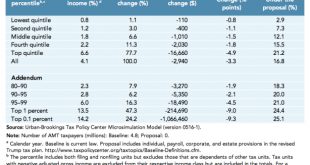The new quarterly Irish GDP statistics are in. They are, again, bewildering. Ireland grows because investments are down…. I’ll explain. On the one hand we read: ‘Overall total domestic demand declined by 1.8% in Q3 2016 compared with Q2 2016.’. This decline was led by a 17,8% decline in investments. On the other hand we read: “The National Accounts results show an increase of 4.0% in GDP and an increase of 3.2% in GNP in Q3 2016 compared with Q2 2016“ A heft growth of GDP in combination...
Read More »Disagreeing with Paul Krugman: His friends probably do vote against the interest of the working class (white and other)
from Dean Baker Paul Krugman told readers that intellectual types like him tend to vote for progressive taxes and other measures that benefit white working class people. This is only partly true. People with college and advanced degrees tend to be strong supporters of recent trade deals [I’m including China’s entry to the WTO] that have been a major factor in the loss of manufacturing jobs in the last quarter century, putting downward pressure on the pay of workers without college...
Read More »Insane inequality
from David Ruccio Income inequality continues to grow in the United States—which represents the very definition of insanity: “doing the same thing over and over again and expecting different results.” According to recent data by Thomas Piketty, Emmanuel Saez, and Gabriel Zucman, from 1979 through 2006, the share of pre-tax income going to the bottom 50 percent of U.S. households fell from an already-low 20.1 percent to an even-lower 13.5 percent. During that same period, the top 1...
Read More »Statistical significance is not real-world significance
from Lars Syll As shown over and over again when significance tests are applied, people have a tendency to read ‘not disconfirmed’ as ‘probably confirmed.’ Standard scientific methodology tells us that when there is only say a 10 % probability that pure sampling error could account for the observed difference between the data and the null hypothesis, it would be more ‘reasonable’ to conclude that we have a case of disconfirmation. Especially if we perform many independent tests of our...
Read More »Italy’s political troubles have deep economic roots
from Mark Weisbrot Much of the media, and the analysts on which it relies, have provided a misleading narrative on the current political problems in Italy, following Sunday’s “no” vote on a referendum on constitutional changes. It has been lumped together with Trump, Brexit, the upsurge of extreme right-wing, anti-European or racist political parties and “populism,” ― which in much of the media seems to be code for demagogic politicians persuading ignorant masses to vote for stupid...
Read More »Carrier capitalism (or rule and law based vs. deal based capitalism)
from David Ruccio President-elect Donald Trump’s decision to bribe Carrier into keeping 800 manufacturing jobs in Indiana, instead of moving them to one of its Mexican plants, has met with opposition from mainstream economists, both liberal and conservative. Clearly, it’s not about the size of the deal (although $7 million in incentives to keep less than one thousand jobs is a big deal). Carrier corporate parent United Technologies is still planning to outsource production that will...
Read More »The deterioration of social capital
One of the most idiosyncratic developments of the last decades is the rise of mortality of white middle aged USA citizens (graph). According to Anna Case and Angus Deaton this was closely related to abuse of alcohol and opioids. (see graph). The 2015 data are just in: this trend continued (and black men joined it). People were somehow aware of this: the larger the deterioration in health, the larger the swing towards Trump during the recent USA elections (the best postdictor of the...
Read More »Why Trump Won?
“the surge in inequality and the stagnation of wages” from Peter Radford I listened last night to Matt Dickinson from Middlebury college give a talk about the recent election. This is my synopsis: The election did not represent much of a change in voter patterns. Trump’s victory was based more on a tweak rather than a reconstruction of the voting patterns of the 2012 election. So this was not a revolutionary moment, marking, instead, a logical further step in a longer term trend. That...
Read More »A crisis-prone & fragile financial system
from Asad Zaman Prior to the Global Financial Crisis (GFC 2007), many senior economists and policy makers expressed confidence that they had finally solved the problem of business cycles, booms and busts, that plagues capitalism. Because of this over-confidence, early warnings of a looming crisis by Nouriel Roubini, Ann Pettifor, Peter Schiff, Steven Keen, Dean Baker, and Raghuram Rajan, were ridiculed and dismissed. Even after the crisis, many economists thought this was a minor glitch,...
Read More »Class and Trumponomics
from David Ruccio President-elect Donald Trump has inherited an economy that is as divided as the electorate. The question is, what will that economy look like if and when Trump’s right-wing national-populist promises and post-election proposals are enacted? As I have shown in the three installments of the first part of this series, “Class Before Trumponomics” (here, here, and here), over the course of recent decades and continuing through the crash and recovery, the class nature of the...
Read More » Real-World Economics Review
Real-World Economics Review






